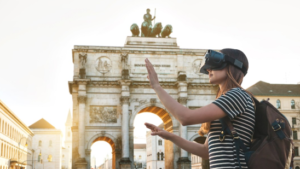Technology and the Travel Industry’s Future
Always changing to satisfy tourists’ needs and expectations, the travel business has always been a vibrant one. Technology is becoming much more important in determining the direction of tourism as we advance into the twenty-first century. From virtual reality (VR) to artificial intelligence (AI), the blending of these cutting-edge technologies is not only a trend but also a revolution that might revolutionize our travel and experience of different locations.

Technology’s Influence on Travel Scheduling
Online Travel Agencies (OTAs) Rising:
Planning a trip used to sometimes include sifting through travel brochures or visiting a travel agent. Online travel agencies (OTAs) including Booking.com, Expedia, and Airbnb today have transformed our hotel and travel service booking process. From the comfort of their own homes, these sites allow visitors to compare rates, read reviews, and locate the greatest deals all of which provide a plethora of knowledge at our hands.
AI’s Role in Customized Suggestions
Another transformation in travel planning is artificial intelligence. Travel firms can provide tailored recommendations based on personal tastes as AI systems examine enormous volumes of data. For instance, AI can recommend similar locations and lodging if a visitor routinely plans beach holidays, therefore improving the whole travel experience. This degree of customizing increases satisfaction and fosters consumer loyalty.
Improving Travel Experiences using Augmented and Virtual Reality
Virtual Reality: An Other Approach to Discover Travel Destination
In the travel industry, virtual reality has become an effective instrument. VR is being used by travel agents to offer immersive experiences allowing prospective guests to visit locations prior to bookings. From your living room, picture almost strolling around Paris’s streets, enjoying the amazing vistas of the Grand Canyon or even scheduling a guided tour at a hotel.
Augmented reality: enhancing on-site experiences
This is advanced by augmented reality (AR), which improves actual experiences. When visitors aim their cellphones at landmarks, for instance, AR applications can offer past data about them. This technology not only enhances the travel experience but also involves younger visitors looking for interactive and educational activities during their journeys.
The Arrival of Smart Technologies in Hospitality
Clever Hotels: A New Comfort Standard
The hotel sector is being revolutionised by smart technologies. Smart technologies are being embraced by hotels more and more to enhance visitor experiences. From voice-activated room controls to keyless access systems, these advances let visitors personalize their stay based on their tastes. Imagine simply your voice regulating the lighting, temperature and even room service ordering!
IoT and Future of Hospitality:
Another technology sweeping through the travel industry is the Internet of Things (IoT). By use of linked gadgets, hotels may better control energy consumption, lower running costs, and improve visitor comfort. Smart thermostats for instance, can seamlessly and environmentally friendly regulate temperatures depending on occupancy.
Transport Technology’s Development
Independent Cars: Changing Mobility
Transportation improves along with technology. For the travel business, the emergence of driverless cars has great promise. Offering ease and safety, self-driving automobiles could transform our exploration of new locations. Travelers might appreciate beautiful paths free of navigation’s stress, therefore improving their whole trip.

Hyperloop with High-Speed Rail: Quicker Linkages
Furthermore promising to cut travel times between important locations are fast-paced rail systems and newly developed technologies like Hyperloop These developments could make weekend trips more practical so that visitors may quickly tour several cities. Along with increasing accessibility, the future of transportation will help to lower the carbon footprint connected with travel.
Eco-friendly Travel via Technology
Green Innovations for Environment
Growing knowledge of environmental problems forces the travel business toward sustainability. Encouragement of environmentally beneficial behavior depends much on technology. Apps tracking carbon footprints, for example, let users choose their lodging and transportation with knowledge. To draw eco-aware guests, hotels are also using energy-efficient technologies, cutting trash and starting recycling programs.
Blockchain for Openness and Trust
Blockchain technology also offers chances to improve travel sustainability. Blockchain can help to guarantee that local populations gain from travel by offering open supply chains. Travelers can confirm the ethical procurement of goods and services, therefore supporting environmentally friendly living and responsible travel.
The Part Social Media Plays in Travel Decisions
Influencer marketing and travel trends
Travel trends are now shaped in great part by social media sites as Instagram and TikHub. Many times looking to influencers for advice, social media is a great tool for the travel business. Businesses are using influencer relationships more and more to advertise their products and reach more general audiences.
User-generated material: a reliable source
Furthermore very important in tourists’ decision-making process is user-generated material such travel blogs and reviews. Real-life encounters among fellow travellers might affect possible guests and strengthen confidence in a place. Travel agencies are thus urged to interact with consumers online, so strengthening community and connection.
Travel’s Future: Noteworthy Developments to Track
Traveling for Business and Leisure: Bleisure
“Bleisure” travel where business trips are prolonged for recreational use is one developing trend. Travelers mixing business and leisure travel as remote work becomes more common creates demand for lodging that meets both demands. Offering co-working areas and leisure activities, hotels are changing to guarantee a pleasant and effective stay.
Space Travel: An Emerging Frontier
Space tourism is an exciting area for the future of travel even though it is still in infancy. Pioneering commercial space flight, companies like SpaceX and Blue Origin provide daring visitors the opportunity to observe Earth from a fresh angle and experience zero gravity. Space tourism could shortly become a reality for the general public as costs drop and technology develops.
Difficulties and Thoughts of Action
Cybersecurity Issues:
Cybersecurity issues also surface when technology gets more included into the travel sector. Cyberattacks target the sector since rising internet bookings and the gathering of personal data make it a target. Maintaining industry confidence and safeguarding travellers’ data depend on strong cybersecurity safeguards.
Managing Human Interaction with Technology
Technology increases personalizing and convenience, but it also runs the danger of reducing human interaction. The travel business has to strike a mix between using technology and offering real client service. Making unforgettable travel experiences still depends critically on personal relationships and real-life events.
In essence, accepting the future.
Technology is clearly entwined with the direction of the travel sector. Technology will always be changing our trip plans, on-site experiences, and sustainability promotion as well as other aspects of our travel. We should be aware of the difficulties these developments bring as we welcome them and aim for a balanced approach that gives real human experiences top priority along with creativity.
Understanding and adjusting to these technical changes will help the travel sector flourish in the changing terrain and provide guests enhanced experiences and unforgettable excursions for years to come.
One thing is certain as we gaze ahead: technology will keep transforming our means of transportation, thereby increasing the accessibility, enjoyment and sustainability of the planet for everybody.